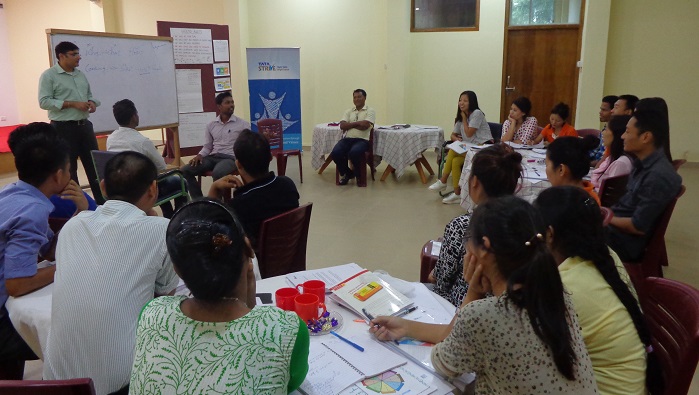
“Coaching skills are an essential tool in a trainer’s toolkit”, says Mr. Bhaskar Natarajan, Professional Certified Coach (PCC), Head – Program Execution, Tata STRIVE.
With emerging technologies, changing nature of work, and increasing complexities at the workplace, a trainer must also be a coach to guide the students in the best way possible. To delve deeper into this, and to know how can one make the transition from a trainer to a coach, the skills required and how it benefits the students, we interacted with Mr. Bhaskar Natarajan, Professional Certified Coach (PCC), Head – Program Execution, Tata STRIVE.
Learn more about Tata STRIVE’s courses and their initiatives in skill development – https://nationalskillsnetwork.in/tata-strive/
These are a few excerpts from our conversation, you can also watch the full video interview on our YouTube channel, for which the link is given below.
Q: Isn’t there an overlap between the roles of trainers, facilitators, and coaches? How would you define them?
A: This is a critical aspect in skill development as the role of a trainer or coach has evolved many centuries ago in our country.
In skill development, we need two kinds of trainers:
- One who shapes the personality of a student in terms of soft skills and non-cognitive skills
- One who teaches the domain skills
We train our trainers in four basic skills at Tata STRIVE:
- Active listening: When youth share their issues with the trainer, he/she must listen to them without any judgment. This will uplift the students to share and interact more.
- Art of asking powerful questions: Every time a student faces a problem, trainers tend to give away a typical solution. This doesn’t help the student when they go out and work. Therefore, we teach our trainers to become coaches by training them in asking powerful questions, instead of giving away instant solutions.
- Helping the youth in setting goals: We train the trainers to help the youth on how to set goals in a SMART way.
SMART here stands for:
S – Specific
M – Measurable
A – Achievable
R – Realistic and
T – Time-bound
After spending three months with the learners, they will achieve at least three to four goals. Students will then gain the confidence to stay in the job.
- To be an accountability partner – This skill will help the trainers to ask more questions on why a learner is unable to achieve the goals, how to navigate obstacles in life, etc. This coaching skill fortifies the trainer to do a better job.

Q: How does the trainer get transformed into a coach and what are the critical aspects of this journey?
Coaching skills are an essential tool in a trainer’s toolkit. But the skillset of a coach must be used based on a situation. We advise the participants not to use coaching in every situation. Instead, they can be a mentor and give the student an opportunity to find their own answers.
Trainers may also be required to be counsellors. The students will need counselling when they are going through a tough phase. A coach is like a wagon that carries people from point A to point B. It is the student who decides where to go.
Trainers help the students in breaking down their goals into small chunks, creating awareness of their obstacles, helping them reach out to others, etc. A trainer as a coach is someone who acts as an accountability partner for a learner.
To make this journey fruitful for the trainers, they need to wither away from the old habits, like giving advice. To keep reminding the trainers about this, we need a supervisor who would help them in training.
Each coach brings a mock problem at work to test the skills of the student. We help the trainers navigate the problem; advise what other options they could have technically used, making it easy to find the solution when the actual situation occurs.
They also help the learners decide for themselves as they embark on a lifelong journey. When a student comes with a challenge or faces an obstacle, the trainer needs to shift to being a coach and advise him/her with the best-suited solution.
Q: Would the students be aware that the same trainer is playing two different roles?
A: We ask the students, who do they want us to be? Whether to be a trainer and give them options or to be a coach and help them think through. If the students want the trainer to be a coach, a trainer takes up this role and helps the students think about alternate solutions.
We also have a tool called as YDCC –Youth Development Coaching Conversation, where we tell the student to ask questions which can help them solve their problems when faced with tough situations.
We have a 6A formula for a trainer to be a coach:
- Awareness
- Acknowledgement
- Aspiration
- Ability
- Action plan
- Accountability structure
At each stage for a change to happen, one needs a partner to think over a solution along with them. So, whenever a target is given, they work as a team.
Also read: Trainers – The real influencers of change – https://nationalskillsnetwork.in/trainers-the-real-influencers-of-change/
Q: How did this transformation of trainers to coaches benefit Tata STRIVE? How can our audience join this programme?
A: One of the challenges was to overcome the motherly instinct of the trainers. This made them react to a problem immediately and not think much about it. However, after the training at Tata STRIVE, trainers are able to think before reacting to a situation.
If someone wants to learn these fundamental skills, they can always reach out to us. At periodic intervals, we conduct a programme called Empowerment Coaching for Facilitators which has both the offline and online component.
After the training, the trainers are expected to apply the learnings in their classes, which will be evaluated by the mentor. After completing the necessary tasks, certificates will be provided. There is also an app that allows the learner to learn virtually.














Comments 1